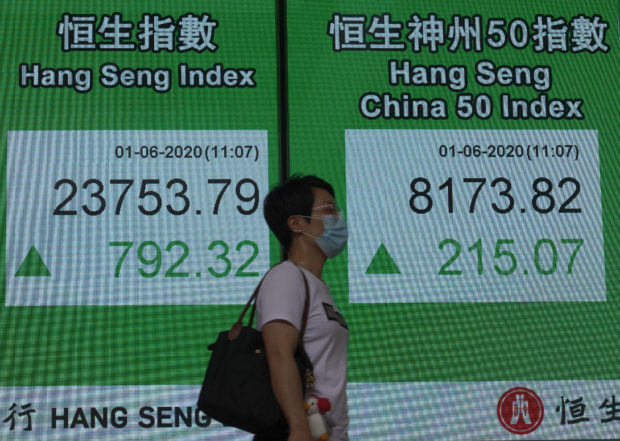Stocks shook off a wobbly start on Wall Street and closed broadly higher Monday, adding to the market’s recent run of solid gains.

A woman wearing a face mask walks past a bank electronic board showing the Hong Kong share index at Hong Kong Stock Exchange Monday, June 1, 2020. Asian stock markets have rebounded after U.S. President Donald Trump avoided reigniting a trade war with China amid tension. (AP Photo/Vincent Yu)
The S&P 500 climbed 0.4% after wavering between small gains and losses in the early going. Banks, companies that depend on consumer spending and communications companies accounted for a big slice of the gains. Health care was the only sector to fall. Bond yields were mostly higher, another sign of optimism among traders. Oil prices fell.
Investors are balancing cautious optimism about the reopening of businesses shut down because of the coronavirus pandemic against worries that the civil unrest across the U.S. over police brutality and racism could disrupt the economic recovery and widen the outbreak.
The daily protests, which began last week in Minneapolis and have since turned violent in multiple cities, are not weighing on the stock market, at least so far.
“The market has been expecting a springtime for economic activity,” said Mike Zigmont, head of trading and research at Harvest Volatility Management. “If these events derail the animal spirits that the markets have been counting on across the country, then I think they will have an impact. But investors are dismissing it as a short-term, non-event.”
The S&P 500 rose 11.42 points to 3,055.73. The Dow Jones Industrial Average gained 91.91 points, or 0.4%, to 25,475.02. The Nasdaq composite climbed 62.18 points, or 0.7%, to 9,552.05. Smaller company stocks had some of the biggest gains. The Russell 2000 index picked up 11.34 points, or 0.8%, to 1,405.37.
The stock market is coming off its second month of solid gains. Stocks have now recouped most of their losses after the initial economic fallout from the coronavirus knocked the market into a breathtaking 34% skid in February and March. The S&P 500 is now down just under 10% from its all-time high in February.
The Federal Reserve and Congress have pledged unprecedented amounts of aid for the economy. That helped spur the market’s move higher from its March lows. Now investors are betting that the worst of the recession has already passed, or will soon, as governments around the country and around the world slowly lift restrictions meant to corral the outbreak.
“I think we are through the worst of it for sure, and the markets reflect that in the bounce we’ve seen,” said David Trainer, CEO of investment research firm New Constructs.
This week will provide market watchers more insight on the impact that the coronavirus is having on U.S. workers and employers. Payroll processor ADP issues its May survey of hiring by private U.S. companies Wednesday.
The next day, the government releases its weekly tally of applications for unemployment aid. And on Friday, the government reports its May labor market data. Analysts surveyed by FactSet expect the report will show the economy lost 9 million jobs last month.
The yield on the 10-year Treasury rose to 0.66% from 0.64% late Friday.
Oil prices ended lower. Benchmark U.S. crude oil for July delivery fell 5 cents to settle at $35.44 a barrel Monday. Brent crude oil for August delivery rose 48 cents to $38.32 a barrel.
European indexes closed broadly higher. Asian markets also finished higher, including a gain of more than 3% for Hong Kong’s stock market.

